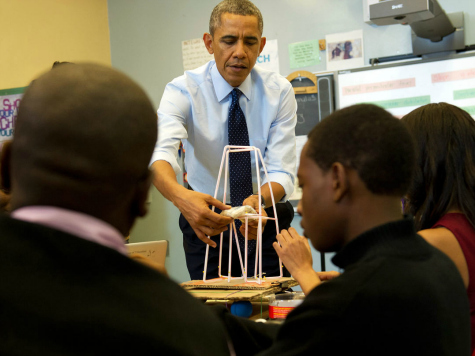
On Tuesday, President Barack Obama announced new initiatives to promote STEM (science, technology, engineering, and mathematics) learning opportunities, but his push for massive amnesty legislation and more guest-worker visas may be setting up young Americans, especially those from low-income backgrounds, for failure.
“When students excel in math and science, they’re laying the groundwork for helping America compete for the jobs and industries of the future,” Obama said, according to pool reports. “That’s why I’m proud to celebrate outstanding students at the White House Science Fair and to announce new steps my administration and its partners are taking to help more young people succeed in these critical subjects.”
In addition to honoring various Science Fair winners, the White House announced a $35 million Department of Education competition to train 100,000 STEM teachers and a “major expansion of STEM AmeriCorps” as part of its “Education to Innovate” campaign “to provide STEM learning opportunities for 18,000 low-income students this summer.”
Yet the White House has also been pushing for legislation that would lessen opportunities for American STEM graduates. The Senate’s amnesty bill, for instance, would make it more difficult for STEM graduates to find jobs and lower wages for those who do find employment in a STEM field. As Breitbart News has reported, the Senate bill that Obama supports would double and possibly triple the number of high-tech visas at a time when there is a surplus of high-tech workers and graduates in the United States.
A Center for Immigration Studies (CIS) report found that from 2007-2012, STEM employment averaged “averaged only 105,000 jobs annually.” During that time, the number of U.S.-born STEM graduates grew by an average of 115,000 a year, and the “U.S. admitted about 129,000 immigrants with STEM degrees,” which means “the number of new immigrants with STEM degrees admitted each year [was] by itself higher than the total growth in STEM employment.”
Four prominent scholars also recently debunked the notion that there is a shortage of American workers in jobs related to science, technology, engineering, and math (STEM). Hal Salzman, a Rutgers University public policy professor, said, “one has to wonder, if there is in fact a shortage, why doesn’t that reflect in the market? Why don’t wages go up?”
Michael Teitelbaum, a senior research associate at Harvard Law School whose new book, Falling Behind? Boom, Bust, and the Global Race for Scientific Talent, said nobody not affiliated with or financed by the high-tech industry has been able to prove that there is a shortage of high-tech workers.
As Teitelbaum noted, most scholarly reports have proven otherwise.
The CIS report, titled, “Is There a STEM Worker Shortage? A look at employment and wages in science, technology, engineering, and math,” was “consistent with research from Georgetown University, the Economic Policy Institute (EPI), the Rand Corporation, the Urban Institute, and the National Research Council that have also found no evidence that America has a shortage of high-tech workers.”
“When formulating policy, elected representatives need to consider the actual conditions in the U.S. labor market, rather than simply responding to pressure from employers in industries that wish to hire large numbers of foreign STEM graduates,” the authors suggested. “While employers may find this situation desirable, it is difficult to argue this is the interest of American people as a whole.”
Ron Hira, a public policy professor at the Rochester Institute of Technology, said there are 50% more graduates than job openings in the STEM fields and and said since the IT sector has been “an area of social mobility,” opportunities for advancement are being reduced by the influx of guest workers.
“You’ve got people who come from working-class backgrounds who go into these sectors,” Hira recently said. “It’s a way of getting into the middle class and the professional class, and that’s being cut off.”

COMMENTS
Please let us know if you're having issues with commenting.